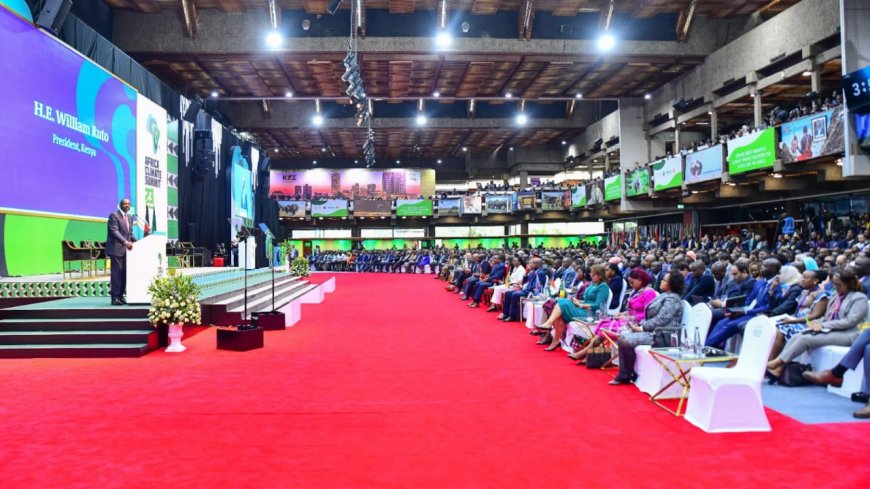Nairobi Declaration on Climate Change

Environment
Nairobi,
Wednesday, September 6, 2023
KNA by Joseph Kamolo
Heads of State and Government in Africa adopted the African leaders Nairobi declaration on climate change and call to action in the presence of global leaders and high-level representatives on 6 September 2023 in Nairobi Kenya.
The leaders commended the Committee of African Heads of State and Government on Climate Change (CAHOSCC) under the Leadership of President Dr. William Ruto for providing a unified approach and political leadership on an African vision that simultaneously pursues climate change and development agenda.
In a joint communique at the end of the three day Africa Climate Summit, the leaders noted the 6th Assessment Report (AR6) of the Intergovernmental Panel on Climate Change (IPCC), stating that the world is not on track to keeping within reach the 1.5°C limit agreed in Paris and that global emissions must be cut by 45 per cent in this decade.
The leaders further underscored the IPCC confirmation that Africa is warming faster than the rest of the world and, if unabated, climate change will continue to have adverse impacts on African economies and societies, and hamper growth and wellbeing.
The leaders expressed concern that many African countries face disproportionate burdens and risks arising from climate change-related, unpredictable weather events and patterns, including prolonged droughts, devastating floods, wild/forest fires, which cause massive humanitarian crisis with detrimental impacts on economies, health, education, peace and security, among other risks.
From the meeting in Nairobi, Kenya the African leaders acknowledged that climate change is the single greatest challenge facing humanity and the single biggest threat to all life on Earth recognising that Africa is not historically responsible for global warming, but bears the brunt of its effect, impacting lives, livelihoods, and economies.
African cities and urban centres are growing rapidly, and by 2050 would be home to over 1.0 billion people. Cognisant of the fact that rapid urbanization, poverty, and inequality limit planning capacities and other urban dynamics which increase people’s exposure and vulnerability to hazards and have thus turned cities into disaster hotspots across the continent.
The declaration reaffirmed the principles set out in the United Nations Framework Convention on Climate Change (UNFCCC) and its Paris Agreement, namely equity, common but differentiated responsibilities and respective capabilities.
Only seven years remain to achieve the Sustainable Development Goals of the 2030 Agenda, noting with concern that 600 million people in Africa still lack access to electricity while 970 million lack access to clean cooking.
It emphasised that Africa possesses both the potential and the ambition to be a vital component of the global solution to climate change. It is home to the world’s youngest and fastest-growing workforce, coupled with massive untapped renewable energy potential, abundant natural assets and entrepreneurial spirit.
The continent has the fundamentals to pioneer a climate-positive pathway as a thriving, cost-competitive industrial hub with the capacity to support other regions in achieving their net zero ambitions.
The declaration acknowledged Africa’s role as one of the largest carbon sinks through the Congo forest and peatland, as well as, the potential in Africa’s savanna grasslands, mangroves, swamps, coral reefs and marine reserves, and noted the progress made by African countries in promoting land and ecosystem restoration through various initiatives and programmes.
The African leaders recognized the critical importance of the ocean in climate action, reversing biodiversity loss and the sustainable development of African and other countries globally, and commitments made on ocean sustainability in multiple fora such as the Second UN Oceans Conference in 2022, the African Union Agenda 2063 and UN Agenda 2030, in COPs 26 and 27 and most recently in the Moroni Declaration for Ocean and Climate Action in Africa.
The Nairobi declaration reiterated Africa’s readiness to create an enabling environment, enact policies and facilitate investments necessary to unlock resources to not only meet own climate commitments, but to contribute meaningfully to decarbonisation of the global economy.
Africa has an estimated 40 percent of the world’s renewable energy resources, only two percent of renewable energy investments in the last decade have come to Africa. Meeting the target by 2030 at an estimated cost translates to a tenfold increase in the finance capital flowing into Africa’s renewable energy sector over the next seven years.
Unlocking Africa’s climate positive growth potential on a scale that can contribute meaningfully to decarbonisation of the global economy will require several multiples of the current development and investment finance flows.
Courtesy; KNA
What's Your Reaction?


































































































































































































































































































